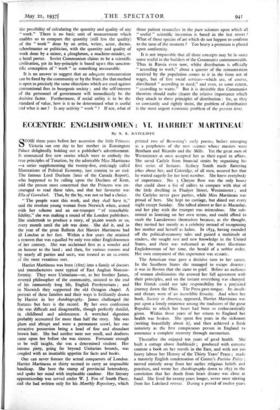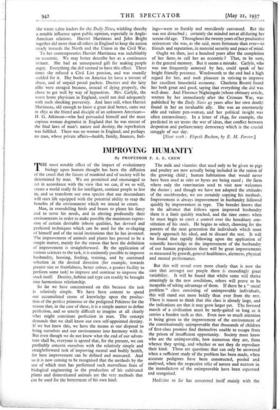ECCENTRIC ENGLISHWOMEN : VI. HARRIET MARTINEAU
By S. K. RATCLIFFE
SOME three years before her accession the little Princess Victoria ran one day to her mother in Kensington Palace delightedly holding out a publisher's advertisement. It announced five new stories which were to embody the true principles of Taxation, by the admirable Miss Martineau —a series supplementing the twenty-five, enticingly called Illustrations of Political Economy, just coming to an end. The famous Lord Durham (later of the Canada Report), who happened to be calling upon the Duchess of Kent, told the person most concerned that the Princess was en- couraged to read these tales, and that her favourite was Ella of Garve-loch. That, by the by, was not so bad a choice.
" The people want this work, and they shall have it," said the resolute young woman from Norwich when, armed with her scheme and an ear-trumpet " of remarkable fidelity," she was making a round of the. London publishers. She undertook to produce a story, of 30,000 words or so, 'every month until the job was done.. She did it, and in the year of the great Reform Act Harriet Martineau had all London . at her feet. Within a few years she attained a renown. that was equalled by only two other Englishwomen of her century. She was acclaimed first as a wonder and an honour to the land ; and then, for various reasons and by nearly all parties and sects, was treated as an eccentric of the most vexatious sort.
. Harriet Martin' eau was born (1802) into a family of doctors and manufacturers most typical of East Anglian Noncon- formity. They were Unitarians—or, as her brother James, revered philosopher of the community, insisted to the end of his immensely long life, English Presbyterians ; and in Norwich they supported the old Octagon chapel. A Portrait of these families and their ways is brilliantly drawn by Harriet in her Autobiography. James challenged the features but hers is the record. By her own confession she was difficult and disagreeable, though perfectly dutiful, in childhood and adolescenee. A wretched digestion probably accounted for more than half the story. She was glum and 'abrupt and wore a _permanent scowl, her one attractive possession being a head of fine and abundant brown hair. She had neither taste nor smell, and deafness came upon her before she was sixteen. Fortunate enough to be well taught, she was a determined student. Her intense piety, going far beyond Unitarian bounds, was coupled with an insatiable appetite for facts and books.
One can never foresee the actual conquerors of London. Harriet Martineau at thirty seemed to carry an impossible handicap. She bore the stamp of provincial heterodoxy, and spoke her mind with implacable candour. Her literary apprenticeship was served under W. J. Fox of South Place, and she had written only for his Monthly Repository, which printed two of Browning's early poems, before emerging as a prophetess of the new science whose masters were Bentham and Ricardo and the Mills. Yet the great men of Westminster at once accepted her as their equal in affairs. She saved Carlyle from financial straits by organising his first series of lectures. Sydney Smith made flattering jokes about her, and Coleridge, of all men, assured her that he waited eagerly for her next number. She knew everybody of importance. No. 5 Cheyne Row was the only house that could show a list of callers to compare with that of the little dwelling in Fludyer Street, Westminster ; and the Carlyles never gave parties, while Miss Martineau was proud of hers. She kept no carriage, but dined out every night except Sunday. She talked almost as fast as Macaulay, and her play with the trumpet was miraculous. She sub- mitted to lionising on her own terms, and could afford to snub the Lansdownes themselves because, as she thought, they invited her merely as a celebrity instead of recognising her mother and herself as ladies. In 1834, having rounded off the political-economy tales and gained a multitude of readers, she sought rest and new knowledge in the United States, and there was welcomed as the most illustrious Englishwoman of her time, the herald of a nobler order. Her own enjoyment of this experience was ecstatic.
The American tour gave a decisive turn to her career. In the Southern States she managed to escape disaster ; it was in Boston that she came to grief. Before an audience of women abolitionists she avowed her full agreement with their principles, and on the instant everything was changed. Her friends could not take responsibility for a projected journey down the Ohio. The Press gave tongue. Its insults and threats were of an incredible ferocity. And when her book, Society in America, appeared, Harriet Martineau was put upon a lonely eminence among the traducers of the great Republic to which her heart had been so enthusiastically given. Within three years of her return to England her health was broken. She spent five years in the sickroom (writing beautifully about it), and then achieved a fresh notoriety as the first conspicuous person in England to announce a complete recovery through mesmerism.
Thereafter she enjoyed ten years of goad health. She built a cottage above Ambleside ; produced with extreme content a book on her travels in the East, and with not too heavy labour her History of the Thirty Years' Peace ; made a masterly English condensation of Comte's Positive Polity ; moved entirely away from her earlier religious beliefs and practices, and wrote her Autobiography down to 1855 in the conviction that her death from heart disease was close at hand. She lived for twenty years longer, never once stirring from her Lakeland retreat. Daring a period of twelve years she wrote 1,600 leaders for the Daily News, wielding thereby a notable influence upon public opinion, especially in Anglo- American relations. Harriet Martineau and John Bright together did more than all others in England to keep the nation steady towards the North and the Union in the Civil War.
To her contemporaries Harriet Martineau was indubitably an eccentric. We may better describe her as a continuous irritant. She had an unsurpassed gift for making people angry. Everything she did seemed to have this effect. Three times she refused a Civil List pension, and was roundly scolded for it. Her books on America let loose a torrent of abuse, and of unpaid postal packets. Doctors and the laity alike were enraged because, instead of dying properly, she chose to get well by way of hypnotism. Mrs. Carlyle, the worst home physician in England, could not deal adequately with such shocking perversity. And later still, when Harriet Martineau, old enough to know a great deal better, came out in 1851 as the friend and disciple of an unknown American— H. G. Atkinson—who had persuaded himself and the most copious woman dogmatist in England that he was master of the final laws of man's nature and destiny, the reprobation was fulfilled. There was no woman in England, and perhaps no man, whose private affairs—health, family, finances, feel- ings—were so frankly and mercilessly canvassed. But she was not disturbed ; certainly she minded not at all during her serene old age. Throughout the twenty years of her productive retirement she was, as she said, more fortunate than ever—in friends and reputation, in material security and peace of mind.
Ought we then, just a hundred years after the completion of her fame, to call her an eccentric ? That, to be sure, is the general memory. But it seems a mistake. Carlyle, who was too frequently annoyed by her, could speak of her bright friendly presence. Wordsworth to the end had a high regard for her, and took pleasure in striving to improve her excellent household economy. Charlotte Brontë found her both great and good, saying that everything she did was well done. And Florence Nightingale (whose obituary article, written by her immediately after the Crimean War, was published by the Daily News 45 years after her own death) found in her an invaluable ally. She was an enormously able and valiant pen-woman, and her political insight was often extraordinary. In a letter of 1849, for example, she predicted in set terms the war of ideas, that conflict between despotism and parliamentary democracy which is the crucial struggle of our day.
[Next week : Elspeth Buchan, by E. M. Forster.]















































 Previous page
Previous page